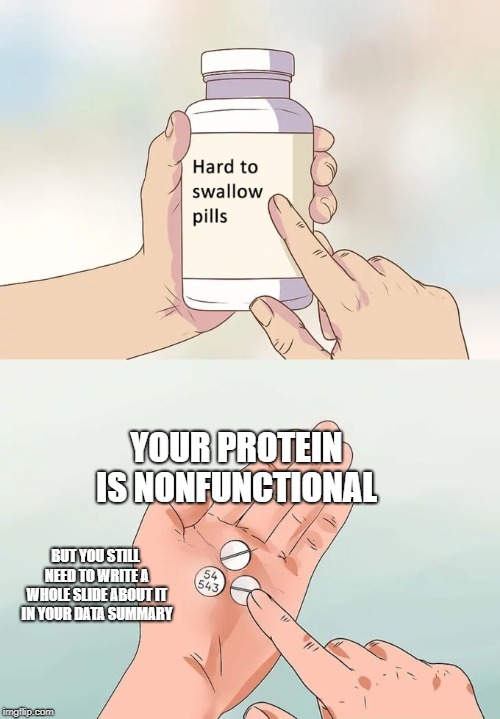Scientific writing, it doesn't work like that...
Based on research papers I read, I was under the impression that scientific writing should be filled with technical terms, smart-sounding big words, and roundabout logic that only the smartest of the smart could understand. Except apparently it doesn't work like that...
Interestingly, one of the trickiest things about scientific writing that I learned (or am still trying to learn) during this module was finding the balance between jargon and colloquialism. I used to think that if I couldn't grasp the message of a paper or read a graph, it was my fault for not being smart enough to understand it. Now, I realize that the goal of scientific writing is maximum clarity. Using the same word repeatedly is encouraged because switching names can be misleading. Redundancy is often not viewed as excessive but helpful since it indicates to the reader the main takeaways from the paper.
I then thought it would be an easy change to make since I should be writing more directly than before, right? Except it didn't work like that. I found it challenging to fix old habits and cut down on words. It looked so...bare. Was I insulting my reader's intelligence by laying things out so flatly? Does my intelligence seem questionable if I use simple terms? There is adjusting to be made...in moderation. To keep the meaning of my writing precise, I still need to maintain a level of professionalism and avoid writing about my project the way I would verbally explain it to someone. I didn't even realize that some phrases commonly said in lab was slang and not official. Instead of "running" my gel, I should say I "electrophoresed" it.
Another adjustment that I should have seen coming but didn't: all-nighters don't do the trick anymore. My previous approach to writing essays has always ended up being pulling an all-nighter for it and churning it out. I may even go so far to say that sleep-deprived, pressured, and adrenaline-charged state of my brain even helped move writing process along by pumping the "creative juices" while reason and logic weren't quite sustainable anymore. A fogged brain makes it easier to see things that may or may not be there, which isn't necessarily a bad place to be when struggling to derive meaning from a book for literature analysis. BUT, for scientific writing, that type of brain is in no way up for the task at all. It's impossible to determine how to present the relationship between the numerous parts of my experiment when the logic stops making sense even to me. On that note, I vow to start the Mod 2 paper early! Let us all take this vow.
-Thing 2 of WF Yellow Team
P.S.
I still find myself writing this after 3am...but blogs require creative juices, yes?
P.P.S.
While the creative juices are flowing, I present to you my very first meme! Oh the things I do for 20.109
Interestingly, one of the trickiest things about scientific writing that I learned (or am still trying to learn) during this module was finding the balance between jargon and colloquialism. I used to think that if I couldn't grasp the message of a paper or read a graph, it was my fault for not being smart enough to understand it. Now, I realize that the goal of scientific writing is maximum clarity. Using the same word repeatedly is encouraged because switching names can be misleading. Redundancy is often not viewed as excessive but helpful since it indicates to the reader the main takeaways from the paper.
I then thought it would be an easy change to make since I should be writing more directly than before, right? Except it didn't work like that. I found it challenging to fix old habits and cut down on words. It looked so...bare. Was I insulting my reader's intelligence by laying things out so flatly? Does my intelligence seem questionable if I use simple terms? There is adjusting to be made...in moderation. To keep the meaning of my writing precise, I still need to maintain a level of professionalism and avoid writing about my project the way I would verbally explain it to someone. I didn't even realize that some phrases commonly said in lab was slang and not official. Instead of "running" my gel, I should say I "electrophoresed" it.
Another adjustment that I should have seen coming but didn't: all-nighters don't do the trick anymore. My previous approach to writing essays has always ended up being pulling an all-nighter for it and churning it out. I may even go so far to say that sleep-deprived, pressured, and adrenaline-charged state of my brain even helped move writing process along by pumping the "creative juices" while reason and logic weren't quite sustainable anymore. A fogged brain makes it easier to see things that may or may not be there, which isn't necessarily a bad place to be when struggling to derive meaning from a book for literature analysis. BUT, for scientific writing, that type of brain is in no way up for the task at all. It's impossible to determine how to present the relationship between the numerous parts of my experiment when the logic stops making sense even to me. On that note, I vow to start the Mod 2 paper early! Let us all take this vow.
-Thing 2 of WF Yellow Team
P.S.
I still find myself writing this after 3am...but blogs require creative juices, yes?
P.P.S.
While the creative juices are flowing, I present to you my very first meme! Oh the things I do for 20.109

Comments
Post a Comment